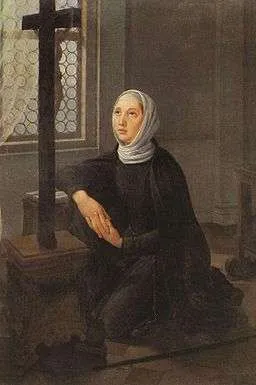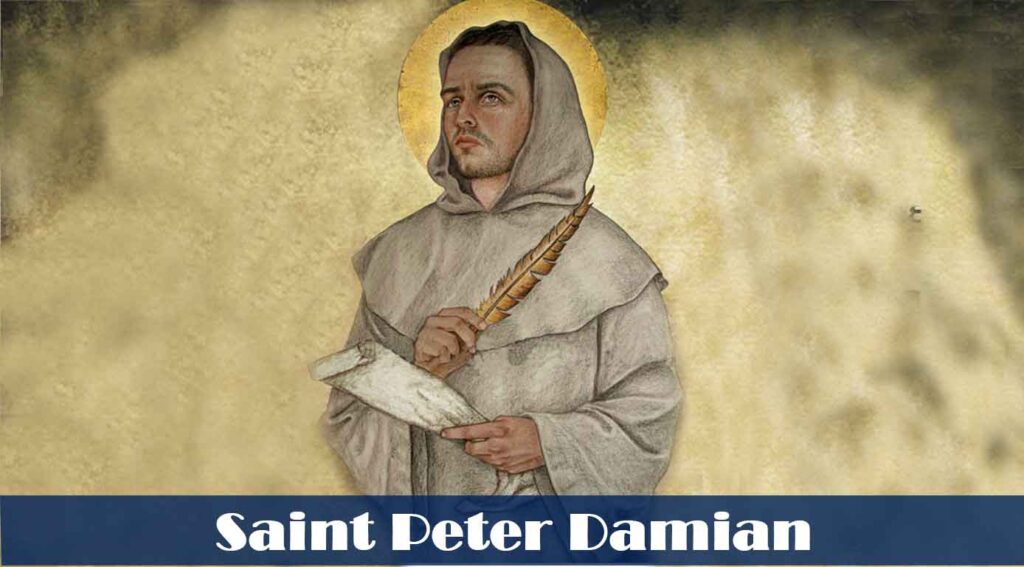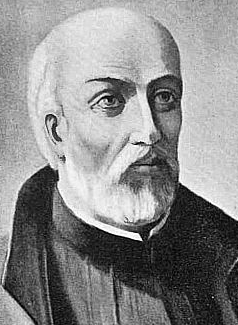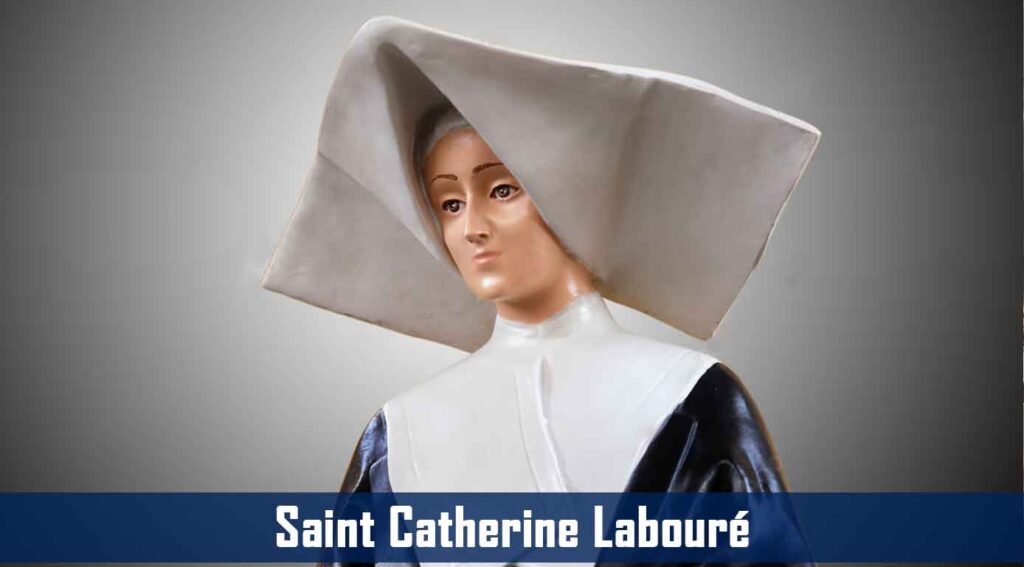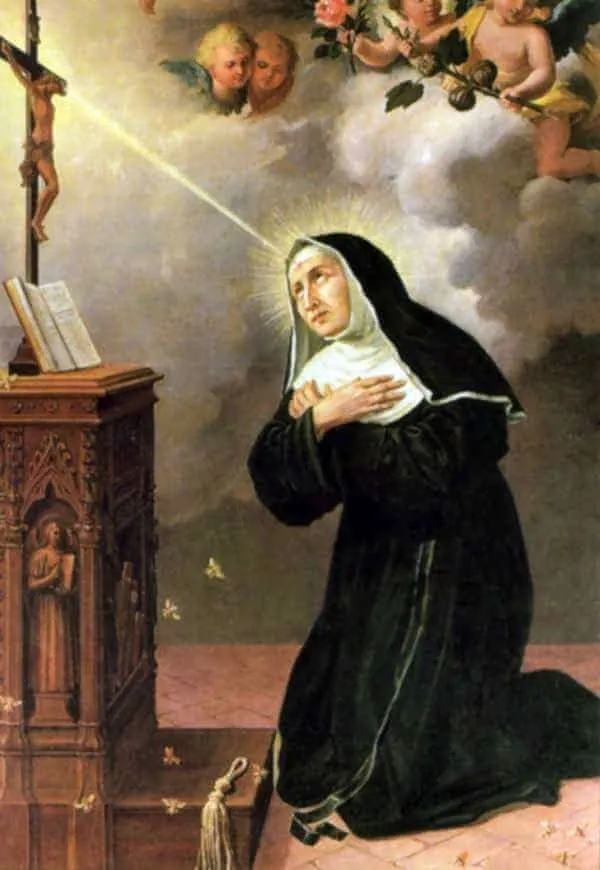Patron Saint of sickness, death of parents, disabled, handicapped, or physically challenged people; Canonized May 24, 1807 by Pope Pius VII
Angela was the youngest of five children born to her virtuous and faith-filled parents. She was born in the town of Desenzano in northern Italy. Shortly afterward, her family moved to a farm just outside of town where Angela was raised. Angela was well trained in the Catholic faith as a youth.
Each day, her father would read to the family about the lives of the saints from “The Golden Legend,” flooding little Angela’s mind and heart with a desire to imitate them. As a teenager, however, tragedy struck her family not once, not twice, but three times. Angela’s father, mother, and sister all died within a short period of time, leaving Angela and her three brothers orphaned.
After the deaths of her parents and sister, Angela and her youngest brother moved to the town of Salò, about fifteen miles north of Desenzano, to live with their uncle, her mother’s brother. Her uncle was also a virtuous man, and Angela continued to grow in her faith under his loving care.
Around the age of twenty or twenty-two, Angela joined the Third Order Franciscans, the lay branch of the larger Franciscan Order. Third Order Franciscans did not take the same vows as consecrated men and women and lived out their vocations in the midst of the world.
As a Third Order Franciscan, Angela then began her lifelong custom of wearing the simple Franciscan Tertiary habit. She also informed her uncle that she wanted to dedicate her whole life to Christ, rather than get married. Soon after, her uncle died and Angela decided to move back to her family home in Desenzano to begin a new life as a lay Franciscan. She remained there for about the next twenty years.
At some point it is believed that Angela had one or more visions that increased her trust in God and deepened her commitment to her vocation. Angela was deeply concerned about whether her sister was in Heaven, and her heart longed for reassurance. Her answer came in the form of a vision she had of her sister joining in a Heavenly procession with angels and other young girls. This put Angela’s heart at rest. In that same vision or in a subsequent one, she saw a ladder leading to Heaven and several young virgins climbing that ladder.
This vision became the seed of her calling to teach young girls about God and to form them for holy living. Angela began to teach young girls who would gather in her home each day to help them become better Christians. Soon, other young single women began to imitate her, welcoming girls into their homes. These laywomen teachers formed a loose association among themselves, joining in a united mission and lay vocation. After twenty years in Desenzano, Angela was invited to start another house in the nearby city of Brescia.
In Brescia, Angela became well known and well loved by many, especially by young women in need. She counseled many, including former prostitutes, the upper class, the poor, and all who sought her guidance. In 1535, at the age of sixty-one, Angela finally fulfilled the final part of her mission when she gathered twenty-eight other virgins to form the lay organization of women known as the “Company of Saint Ursula.”
Saint Ursula was a fitting patron for them, since she was the patron saint of schoolgirls. The Company of Saint Ursula was the first secular institute for laity in the history of the Church. For women at that time, the only two options they traditionally had were either to enter marriage or to join a cloistered convent. This new lay association was the first to offer young women a third option. A couple of years later, Angela was elected the mother of this new company and remained so until her death in 1540.
At the time of her death, the Company had about 150 members. Four years after her death, in 1544, Pope Paul III issued a Papal Bull approving the Rule of the Company of Saint Ursula. Though the Company of Saint Ursula remains today, some of the Company’s first members formally branched off into a new religious order called the Ursulines under the leadership of Archbishop Saint Charles Borromeo of Milan in 1572. Both the “Ursulines” and the “Company of Saint Ursula,” which are distinct entities in the Church, point to Saint Angela as their founder.
God used Saint Angela for a unique mission. She fell in love with her God at an early age, dedicated herself solely to Him as her Spouse, and followed His will as it unfolded. At first, her mission was a personal mission of loving girls and guiding them to God in her home. Eventually, God expanded that mission and enfolded it into His Church.
God does not call every person to start a new movement within the Church or to spark the beginnings of a religious order, but He does call us all to see the needs of those around us and work to meet those needs with love and devotion. Saint Angela saw the need to care for and teach young girls. Ponder the needs that are present around you and in imitation of Saint Angela, offer yourself to God so that you may help meet those needs in accord with God’s divine will.
Source: https://mycatholic.life/saints/saints-of-the-liturgical-year/january-27-saint-angela-merici-virgin/


